Looking back on the past year, there’s no question 2022 was eventful for Advanced Custom Fields. I’m a big fan of year in review posts, reading reviews from others is inspirational and writing them yourself is a great way to reflect and prepare for the year ahead, so I thought it was time to bring them back to the blog.
TL;DR – Our releases this year brought support for ACF Blocks in the Site Editor, support for the Query Loop block, a new generation of ACF Blocks, and a refreshed UI. In addition, ACF became part of WP Engine, giving us much greater access to development and testing resources.
Let’s take a look at what I’ll be covering:
Big News for ACF in June 2022
Let’s cover the biggest ACF news of 2022 first. It might have appeared ACF had a quiet second quarter of the year, but by now everyone knows that things were brewing behind the scenes.
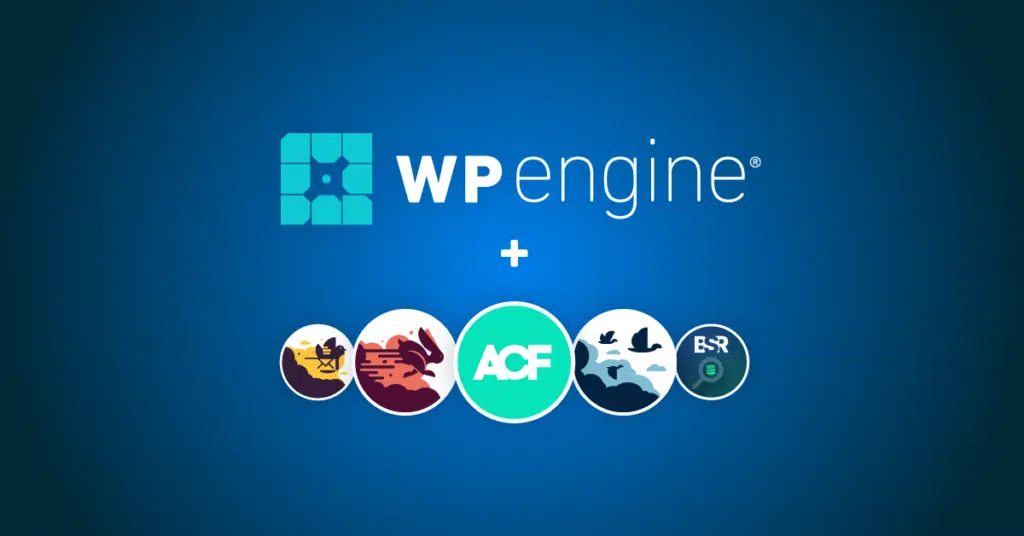
In June 2022, ACF was acquired by WP Engine, along with WP Migrate, WP Offload Media, WP Offload SES, and Better Search Replace.
All the plugin and site development teams joined WP Engine and have continued to work on the plugins ever since. Liam and Matt have joined a larger team of engineers now, all working on ACF, and I have been able to slowly take off the many hats I was wearing at Delicious Brains. I can now lean on support, marketing, product, and infrastructure teams at WP Engine to make it easier for me to do my job as product manager.
It’s common for there to be some trepidation during acquisitions like this, among both users and staff. Judging by what we’ve accomplished since, I’m inclined to think that trepidation has been allayed on both fronts. I always knew WP Engine had a reputation as being a developer-focused company, but I’ve been pleasantly surprised by just how much effort and care goes into building not just a hosting platform, or a suite of products, but a whole experience for WordPress builders. From Local, the development environment tool for WordPress, to building headless WordPress sites with Atlas, to producing excellent educational content for WordPress builders, WP Engine is continuing to serve the WordPress community.
Plugin Releases
We started 2022 strong, with the release of ACF 5.12. We were especially excited for this release, as it included full compatibility between ACF Blocks and the WordPress Site Editor.
The release of WordPress 5.9 made block-based editing available not just to posts and pages, but to the whole site. With this release, we ensured ACF Blocks would work everywhere across WordPress.
ACF 5.12 also included support for the Query Loop block, first introduced in WordPress 5.8. The Query Loop block is a special kind of block, with nested blocks inside it, that iterates over posts returned by the query. Support for Query Loop blocks allow you to enrich them with ACF Blocks and custom data, and help you make the switch to block theme development.
We released ACF 5.12.1 on March 23, which included increased REST API support, fixes, and several new translations contributed by users. ACF 5.12.2 followed in early April with a few more fixes.
New Home, Same Shipping
Our first release after the acquisition was 5.12.3, a security fix we released on July 14.
We spent the next few months extensively beta testing ACF 6.0 and gathering customer feedback through release candidates before the full release of ACF 6.0 and ACF PRO 6.0 on September 21.
The new release included a UI refresh for both versions, pagination for repeater fields with large amounts of data, and a new generation of ACF Blocks. The UI refresh reorganized the field settings into tabs that logically group the settings, added buttons for creating and saving fields to the header bar, and improvements to how fields are open, closed, and reordered.
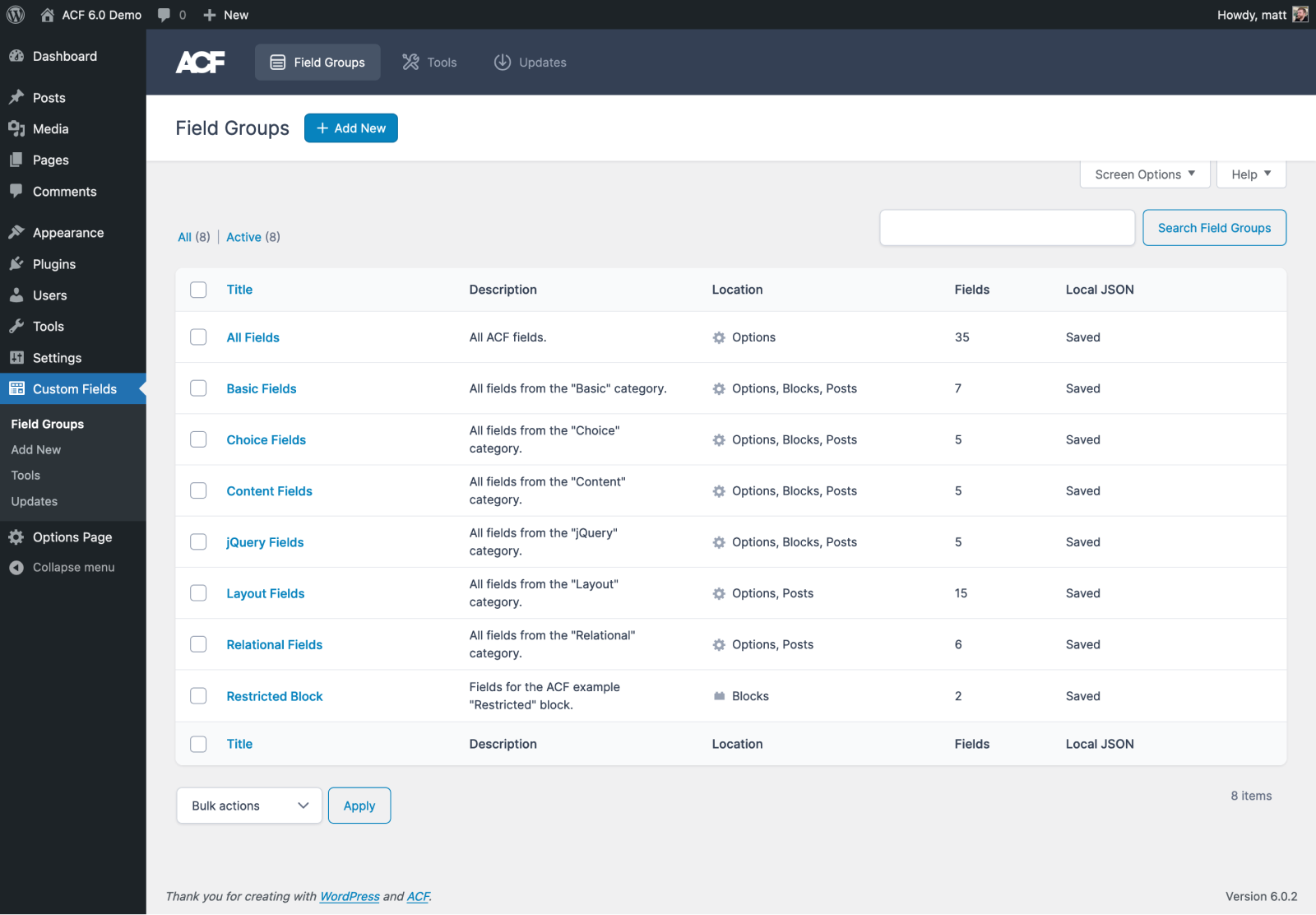
ACF 6.0 also introduced ACF Blocks Version 2, bringing us much closer to the native block experience with block.json support, while still using PHP-based templating language, and a new block versioning system that allows you to opt in to new versions of ACF Blocks with different markup and structure.
Updates and fixes were released soon after, with ACF 6.0.1 on September 28 and 6.0.2 on September 29.
ACF 6.0.3 included enhancements and fixes to the new UI and important security changes regarding where the ACF shortcode can be used. The release also introduced new settings and filters to control the ACF shortcode.
A number of small improvements were introduced with ACF 6.0.4, including showing tooltips for field settings as inline instructions, and disabling saving of field groups before entering a field group title. ACF 6.0.5 fixed an issue where uploading multiple files nested in a subfield could cause a fatal error when using the basic uploader.
Ending 2022 With UX Improvements and Greater User Control
We ended the year with the release of 6.0.6, featuring an improved UX for Flexible Content field layouts and the ability to disable the Field Settings tabs introduced in 6.0.
The Flexible Content field is one of ACF’s most powerful field types with many uses for site developments, but the user experience when adding and editing layouts hasn’t always been great. In particular, having a lot of layouts made navigation challenging.
Customer feedback guided our decision making process throughout design and implementation of the Flexible Content UX improvements. You can get all the details in the release post, or just take a look below:
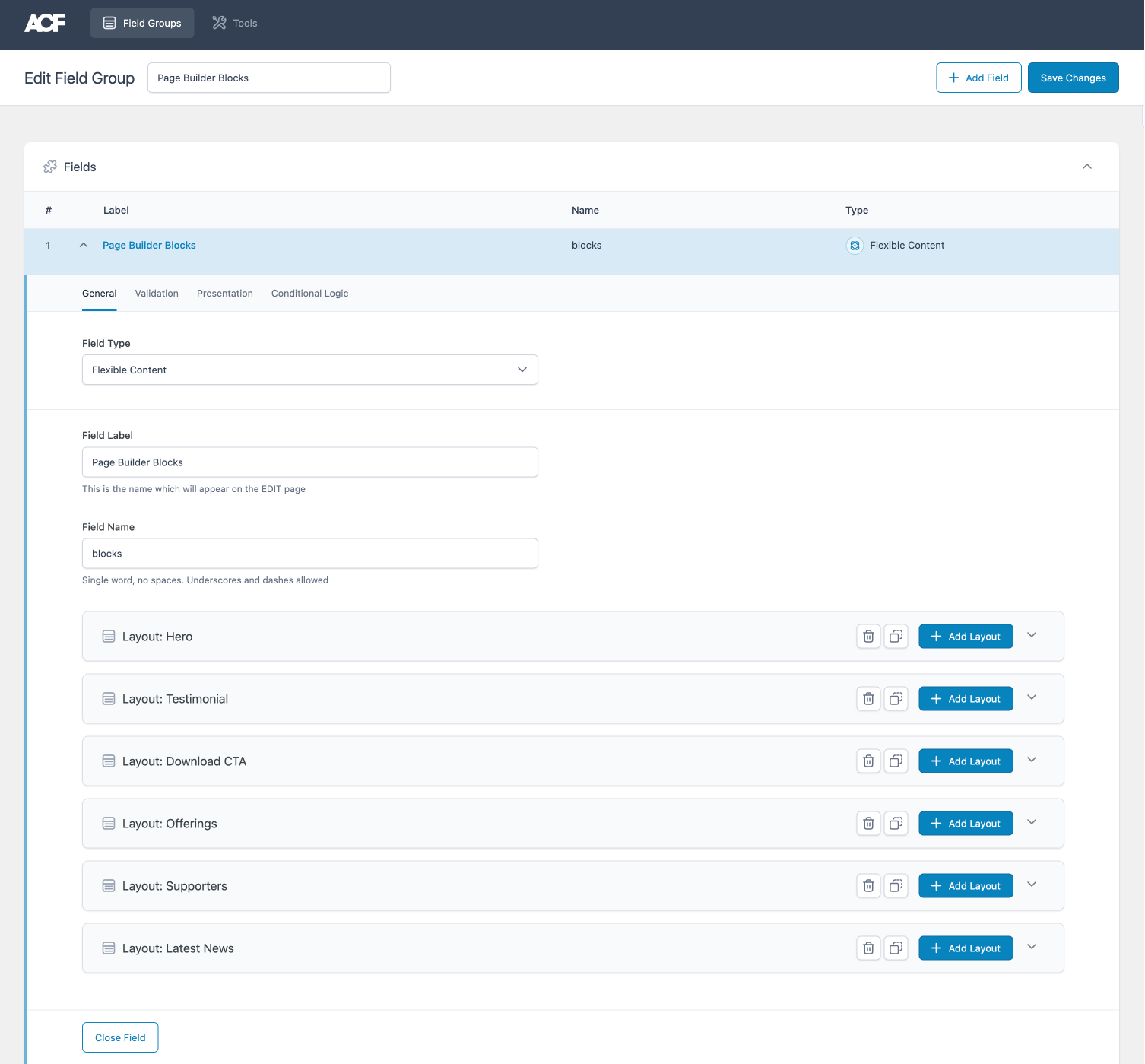
6.0.6 also introduced a new setting to turn off the field settings tabs introduced in 6.0. Unchecking “Field Settings Tabs” in “Screen Options” disables the tabs and puts all the field settings into one large panel, like in ACF 5.0:
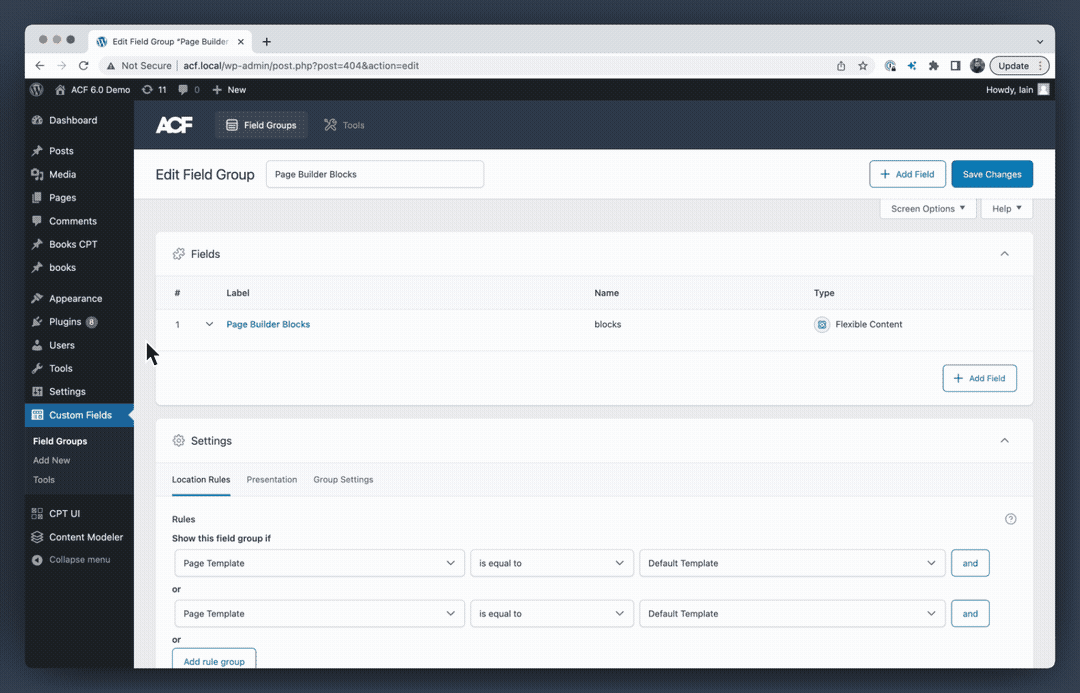
Every release of ACF since 6.0 has included at least one tweak or change addressing a specific point of feedback from one of our users. We’re proud to work collaboratively with you to progress ACF’s development. Please keep letting us know what’s working for you, and where you’d like to see us put our focus in 2023.
Statistics
For a plugin the size of ACF, the statistics behind all the work and usage are really interesting to me, so I thought I’d share some.
Support
The customer support for ACF has always been a big part of the plugin, big being the operative word. In 2022 the support team did an excellent job:
- They answered a total of 20,896 tickets
- An average of 1,741 tickets per month
- An 85% average customer satisfaction score
Development
The engineering team have worked incredibly hard this year:
- Shipped 2 major releases
- Shipped a total of 14 releases
- Pushed 1,969 commits of code (+169% from 2021)
Usage
The free plugin has over 2 million active installs, and WordPress is reporting almost 40% of them are running ACF 6.0:
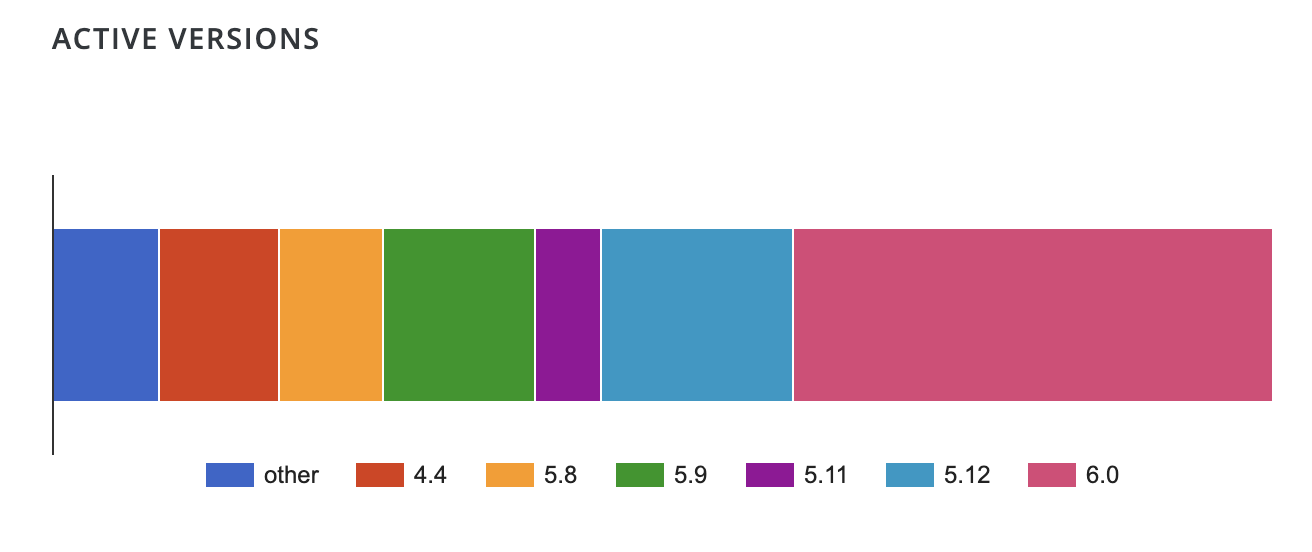
Let’s have a look at data about sites that activated ACF PRO in 2022:
ACF Major Version
| ACF version | % sites |
|---|---|
| 6.0 | 62.51% |
| 5.0 | 37.47% |
WordPress Version
| WP version | % sites |
|---|---|
| 6.1.1 | 36.99% |
| 6.0.3 | 10.74% |
| 5.9.3 | 8.96% |
| 6.0.2 | 7.39% |
| 6.0.1 | 6.78% |
| 6.1 | 5.70% |
PHP Version
| PHP version | % sites |
|---|---|
| 7.4 | 63.43% |
| 8.0 | 20.84% |
| 8.1 | 8.36% |
| 7.3 | 4.94% |
| 7.2 | 1.53% |
| 7.1 | 0.36% |
Looking Forward
I’m really looking forward to 2023. We have lots of great stuff planned. Early in the year we aim to bring you Custom Post Type and Taxonomy registration in the UI, as well as Composer support for installing the PRO plugin.
Further improvements to the Flexible Content and Repeater fields are planned, specifically looking at improving the editing experience for content editors, as well as developer quality of life tweaks such as supporting multiple locations for JSON files for Field Group definitions.
We will be working on refining the new UI where needed, as well as constantly improving ACF Blocks to stay compatible with WordPress.
Thanks
I’d like to thank the entire team at ACF and WP Engine for what we’ve accomplished in the last year. Together, we’ve expanded what ACF is capable of. The other plugins acquired from Delicious Brains by WP Engine have also made advances in the last year, as documented in Kevin’s year in review post.
The biggest thanks are reserved for our users and customers. Your feedback throughout the development process has been invaluable. Communication and feedback ensures that ACF continues to meet your needs and those of the WordPress community.
What would you like to see from ACF in 2023? Let us know in the comments.

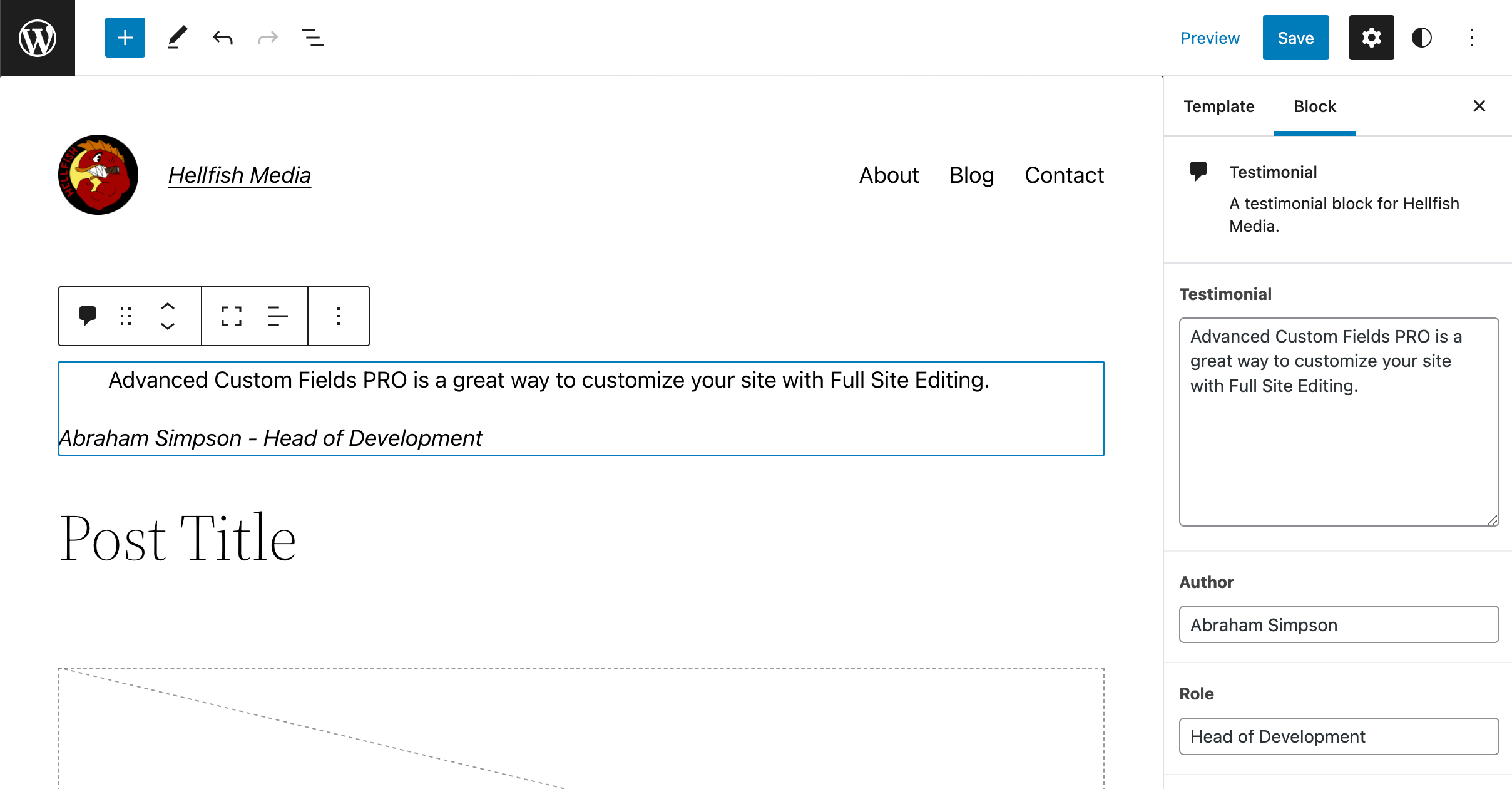
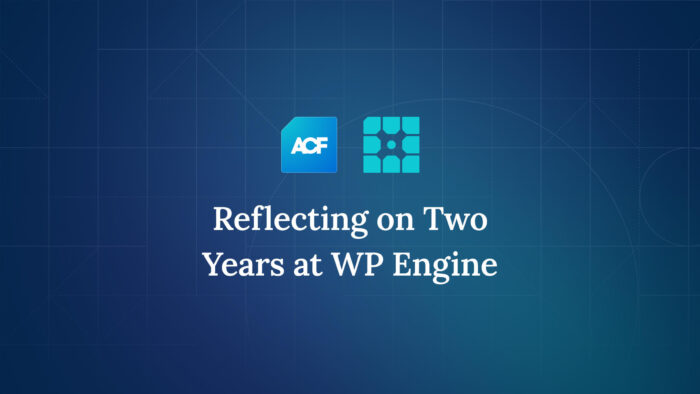


For plugin support, please contact our support team directly, as comments aren't actively monitored.